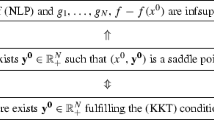Abstract
The sparse linear programming (SLP) is a linear programming problem equipped with a sparsity constraint, which is nonconvex, discontinuous and generally NP-hard due to the combinatorial property involved. In this paper, by rewriting the sparsity constraint into a disjunctive form, we present an explicit formula of the Lagrangian dual problem for the SLP, in terms of an unconstrained piecewise-linear convex programming problem which admits a strong duality under bi-dual sparsity consistency. Furthermore, we show a saddle point theorem based on the strong duality and analyze two classes of stationary points for the saddle point problem. At last, we extend these results to SLP with the lower bound zero replaced by a certain negative constant.
Similar content being viewed by others
References
Babu P, Pelckmans K, Stoica P, et al. Linear systems, sparse solutions, and Sudoku. IEEE Signal Process Lett, 2010, 17: 40–42
Beck A, Hallak N. On the minimization over sparse symmetric sets: Projections, optimality conditions and algorithms. Math Oper Res, 2015, 41: 196–223
Beck A, Yonina C E. Sparsity constrained nonlinear optimization: Optimality conditions and algorithms. SIAM J Optim, 2013, 23: 1480–1509
Bertsimas D, King A, Mazumder R. Best subset selection via a modern optimization lens. Ann Statist, 2016, 44: 813–852
Bucher M, Schwartz A. Second-order optimality conditions and improved convergence results for regularization methods for cardinality-constrained optimization problems. J Optim Theory Appl, 2018, 178: 383–410
Chen A I, Graves S C. Sparsity-constrained transportation problem. ArXiv:1402.2309, 2014
Chen X J, Xiang S H. Sparse solutions of linear complementarity problems. Math Program, 2016, 159: 539–556
Cui Y, Pang J S. On the finite number of directional stationary values of piecewise programs. ArXiv:1803.00190, 2018
Donoho D L. Compressed sensing. IEEE Trans Inform Theory, 2006, 52: 1289–1306
Donoho D L, Tanner J. Sparse nonnegative solution of underdetermined linear equations by linear programming. Proc Natl Acad Sci USA, 2005, 102: 9446–9451
Friedlander M P, Tseng P. Exact regularization of convex programs. SIAM J Optim, 2007, 18: 1326–1350
Li D, Sun X L, Wang J. Optimal lot solution to cardinality constrained mean-variance formulation for portfolio selection. Math Finance, 2006, 16: 83–101
Li X, Song W. The first-order necessary conditions for sparsity constrained optimization. J Oper Res Soc China, 2015, 3: 521–535
Liu J, Chen J, Ye J. Large-scale sparse logistic regression. In: Proceedings of the 15th ACM SIGKDD International Conference on Knowledge Discovery and Data Mining. New York: ACM Press, 2009, 547–556
Lu Z S, Yong Z. Sparse approximation via penalty decomposition methods. SIAM J Optim, 2013, 23: 2448–2478
Mordukhovich B S, Nam N M. An Easy Path to Convex Analysis and Applications. Synthesis Lectures on Mathematics and Statistics, vol. 6. Williston: Morgan & Claypool, 2013
Pan L L, Luo Z Y, Xiu N Y. Restricted robinson constraint qualification and optimality for cardinality-constrained cone programming. J Optim Theory Appl, 2017, 175: 104–118
Pan L L, Xiu N H, Fan J. Optimality conditions for sparse nonlinear programming. Sci China Math, 2017, 60: 759–776
Pan L L, Xiu N H, Zhou S L. On solutions of sparsity constrained optimization. J Oper Res Soc China, 2015, 3: 421–439
Rockafellar R T. Convex Analysis. Princeton: Princeton University Press, 2015
Rockafellar R T, Wets R J. Variational Analysis. Berlin: Springer, 1998
Scholtes S. Introduction to Piecewise Differentiable Equations. New York: Springer, 2012
Shang M J, Zhang C, Xiu N H. Minimal zero norm solutions of linear complementarity problems. J Optim Theory Appl, 2014, 163: 795–814
Sun C C, Dai R, Mesbahi M. Weighted network design with cardinality constraints via alternating direction method of multipliers. IEEE Trans Control Netw Syst, 2018, 5: 2073–2084
Wei Z H, Link S. Embedded cardinality constraints. In: Proceedings of the International Conference on Advanced Information Systems Engineering. Cham: Springer, 2018, 523–538
Zhu W X, Dong Z S, Yu Y L, et al. Lagrange dual method for sparsity constrained optimization. IEEE Access, 2018, 6: 28404–28416
Acknowledgements
This work was supported by National Natural Science Foundation of China (Grant Nos. 11431002, 11771038 and 11728101), the State Key Laboratory of Rail Traffic Control and Safety, Beijing Jiaotong University (Grant No. RCS2017ZJ001) and China Scholarship Council (Grant No. 201707090019). The authors sincerely appreciate the suggestions and comments from two anonymous referees for the improvement of the paper.
Author information
Authors and Affiliations
Corresponding author
Rights and permissions
About this article
Cite this article
Zhao, C., Luo, Z., Li, W. et al. Lagrangian duality and saddle points for sparse linear programming. Sci. China Math. 62, 2015–2032 (2019). https://doi.org/10.1007/s11425-018-9546-9
Received:
Accepted:
Published:
Issue Date:
DOI: https://doi.org/10.1007/s11425-018-9546-9
Keywords
- sparse linear programming
- Lagrangian dual problem
- strong duality
- saddle point theorem
- optimality condition




